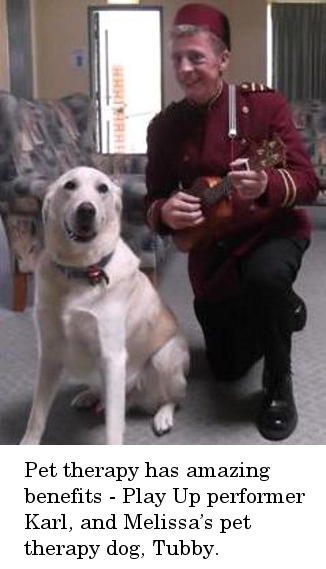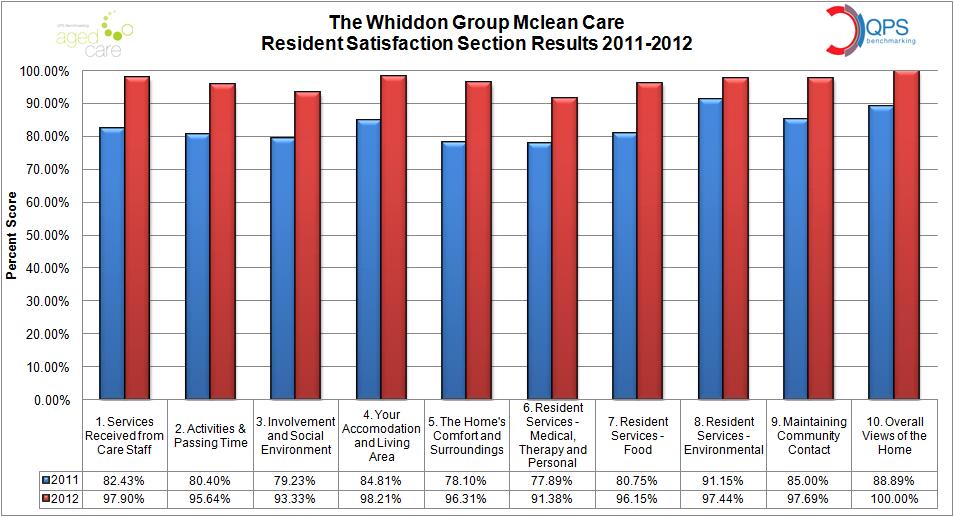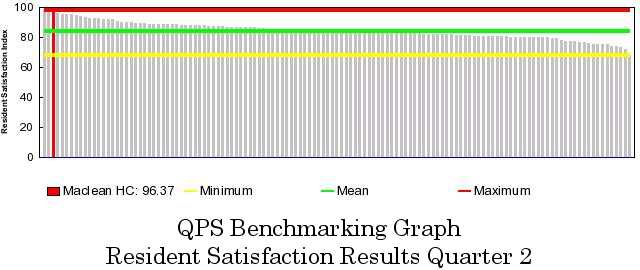Enhancing Stakeholder Satisfaction Using Nominal Group Technique (NGT) - The Whiddon Group Maclean
Enhancing Stakeholder Satisfaction Using Nominal Group Technique (NGT) - The Whiddon Group Maclean
Melissa Dunkley, Director Care Services; The Whiddon Group MacleanAt The Whiddon Group Maclean we have been working with clients and team members over the past 12 months to identify opportunities for improvement. We have been participating in QPS Benchmarking since January, 2001 and have found QPS data to be invaluable in identifying our areas of strength, and opportunities for improvement. QPS Benchmarking data from our 2011 Resident Satisfaction Survey identified three key areas for improvement: promoting continuity in staffing and supporting new Maclean employees beyond their orientation process, diversifying our lifestyle and leisure program, and adjusting our hospitality services to better meet client expectations.

The data collected through QPS Benchmarking provides our team with opportunities for improvement. We value participation and contribution from team members and clients, and utilised Nominal Group Technique (NGT) to decide on projects for improvement and prioritise the order of implementation. NGT supports individuals from the group to contribute their ideas, and uses a collective decision making process by voting on the priority level and how the idea will be implemented. Eight employees from Maclean volunteered to be part of our quality project team and champion the process of collaborating, planning and implementing improvements.
Supporting Team Members
Our first employee project focused on improving care staff services by offering team members opportunities for growth, support, and more flexible rostering practices. We implemented a new and more flexible roster structure that took into consideration employee preferences for shifts, their personal strengths, and team dynamics. Our quality project team held meetings with employees and clients to communicate the proposed change. Feedback was extremely positive with both groups agreeing that rostering people based on their strengths and lifestyle requirements was an innovative move that will contribute to team skills and the quality of care provided. Our new roster system has been in place for 6 months now and has proven highly successful, with clients expressing an increased level of satisfaction with the care services that we are providing.
NGT and our 2011 Resident Satisfaction Survey identified a second opportunity to improve the quality and continuity of care we provide. We developed a mentor program for new employees that provide team members with support and training beyond their orientation process. The program also utilises the skills of our existing team. Our mentor program responds to the gap between orientation and being comfortable working independently, and offers experienced employees a learning and development opportunity where they can support team members to grow and gain experience leading a team. We identified eight senior team members to be our mentors and the mentor program has been in effect for more than six months now.
Our new roster and mentor project demonstrated positive results, with client satisfaction in care staff services increasing from 82.43% in December 2011, to 97.90% in December 2012.
The two employee focused projects were also very successful in reducing the amount of sick leave taken by employees. From introducing the project in June 2012, to the Resident Satisfaction Survey in December 2012, Maclean went from having one of The Whiddon Group's highest sick leave rates, to one of the lowest.

Introducing New Leisure Programs At Maclean
Our third big project for 2012-2013 was to achieve a better understanding of how clients felt about our lifestyle and leisure program, what was well received, and what we could introduce to support client interests. One of our goals was to increase client satisfaction on their level of involvement and social environment. This goal was set after identifying involvement and the social environment as an area with room for improvement in our 2011 survey. Our quality projects team consulted with clients and worked collaboratively to plan and introduce a diverse range of leisure and lifestyle activities. The new program resulted in increased client satisfaction on involvement and social environment from 79.23% to 93.33% over a 12 month period.
Clients expressed a keen interest in having regular pet therapy at the service. As an animal enthusiast I was supportive of the benefits of regular pet therapy and worked with our Maintenance Officer to introduce Maclean's own therapy dog, Tubby. Both clients and employees understood the challenges of accessing pet therapy in a rural town and were very open to the solution of bringing pet, and therapy-dog-in-training, to the service. Tubby now visits clients at Maclean twice a week, bringing much joy and excitement to clients and team members on his visits.
Our annual Resident Satisfaction Survey with QPS enables us to identify the effect that our changes have made to the quality of life for clients. Clients and team members utilise team and client meetings as a forum for change and we are able to measure the implemented changes through reports provided by QPS Benchmarking.
One request that came out of our client meetings was that we introduce buffet meals on theme days, and that we look at ways to improve the quality of food. We welcomed a new chef and hospitality team to Maclean in January 2012, introduced buffet meals on theme days, and asked clients for their requests for special event meals. We have seen a great increase in the level of satisfaction with meals in the December 2012 survey.

Our project team also identified that we needed to diversify our leisure and lifestyle program. To achieve this we used NGT, and gathered ideas and feedback from all team members, rather than just our Leisure Team, and clients. Accessing ideas from all employees and clients presented us with a very diverse range of leisure projects - from theme events and morning teas, to target shooting and hydroponic gardens. We used NGT to decide on the projects that best reflected client interests and team capabilities and now have a leisure and lifestyle program that truly reflects the interests and strengths of the Maclean service. We are currently introducing a hydroponic garden project to grow flowers and strawberries indoors and have been lucky to source a volunteer from the community to help us; we have increased the number of theme days and morning teas; and have been successful in receiving funding for a raised garden bed from Sustain Northern Rivers. We also worked with the Arts Health Institute to increase the frequency of our humour therapy sessions through the Play Up Program and now have sessions every Wednesday.
Benchmarking has been instrumental in making changes and has supported us to identify opportunities for improvement from employee and client feedback. Teamwork and communication was a key to our success in implementing so many new projects and programs that addressed our 2011 feedback. In December 2012 we reached 100.00% on our survey for overall client satisfaction with our service, a wonderful achievement, significant improvement from 88.89% in 2011, and a great example of how benchmarking supports us to continually grow and improve.

0 comments